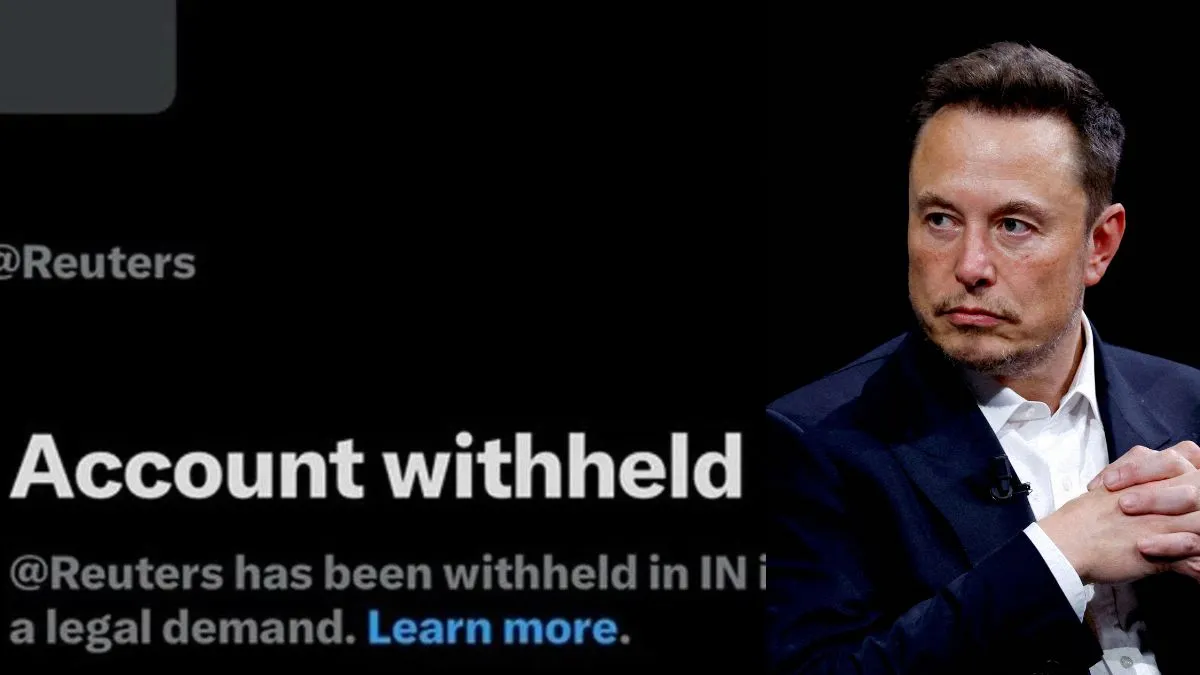- By Supratik Das
- Tue, 08 Jul 2025 04:56 PM (IST)
- Source:JND
Elon Musk-owned social media platform X has leveled new accusations of censorship of the press in India after global news wire agency Reuters and Reuters World's accounts were temporarily withheld in the country due to a government blocking order. X, who was formerly called Twitter, reported that the Indian government commanded it on July 3 to suspend 2,355 accounts, including those of foreign news organizations such as Reuters, "within one hour without explaining." The blocking order came through Section 69A of the Information Technology Act, 2000, which permits authorized officials to instruct platforms to remove content that is illegal or poses a threat to national security and public order.
Reuters Account Blocked Without Reason, X Says
In a formal statement, X's Global Government Affairs department stated, "On July 3, 2025, the Indian government directed X to block 2,355 accounts in India, including Reuters and Reuters World, pursuant to Section 69A of the IT Act. Failure to comply would expose X to criminal liability." The firm also stated that the Ministry of Electronics and Information Technology (MeitY) insisted the block be implemented forthwith, within one hour, without explanation. "The accounts were to be kept blocked until further notice," said X. Later, after outrage in the public sphere, the government asked X to unblock Reuters and Reuters World, which went live again late Sunday evening. X has claimed it was left with “no choice but to obey the order” as non-compliance could have attracted penalties or criminal charges under Indian law.
“We are deeply concerned about ongoing press censorship in India due to these blocking orders. X is exploring all legal options available. Unlike users located in India, X is restricted by Indian law in its ability to bring legal challenges against these executive orders. We urge affected users to pursue legal remedies through the courts,” the platform said in a public post.
Indian Government Declines To Say There Is Any Reuters Ban
Earlier, India's Press Information Bureau (PIB) had stated that no government agency had specifically ordered the blocking of Reuters. The officials confirmed that they were in communication with X to address the issue, but the Ministry of Information and Broadcasting Secretary Sanjay Jaju did not reply to multiple calls for comment. Official Spokesperson, Ministry of Electronics and Information Technology says, "The Government has not issued any fresh blocking order on 3rd July, 2025 and has no intention to block any prominent international News Channels including Reuters and Reuters World. The moment Reuters and Reuters World were blocked on X platform in India, immediately the government wrote to ‘X’ to unblock them. The Government continuously engaged and vigorously pursued with ‘X’ from the late night of 5th July 2025. ‘X’ has unnecessarily exploited technicalities involved around the process and didn’t unblock the URLs. However, after lot of follow-up on hourly basis, X has finally unblocked Reuters and other URLs after 9 pm on 6th July 2025. They took more than 21 hours to unblock Reuters."
ALSO READ: 'What’s Truth Social?' Elon Musk Hits Back After Trump Criticises ‘America Party’ Plan
This is not the first conflict between Elon Musk's company and the government of India. X is already engaged in a legal tussle with the Indian government's new guidelines regarding online content, claiming that increased powers for takedowns infringe upon freedom of speech and press freedom.
ALSO READ: Reuters' X Account Withheld In India; Govt Denies Role, Seeks Explanation From Microblogging Site
India has stood its ground, explaining that its system merely informs platforms of "harmful or unlawful content." Critics contend, however, that Section 69A of the IT Act has frequently been deployed to stifle critics of the government. The Reuters News account, with more than 25 million worldwide followers, and regional Reuters World handle, are once again available for Indian users. Nevertheless, the suspended block and X's revelations have initiated new controversy regarding press freedom, govt censorship, and national security vs. free speech in India, the largest democracy in the world.

